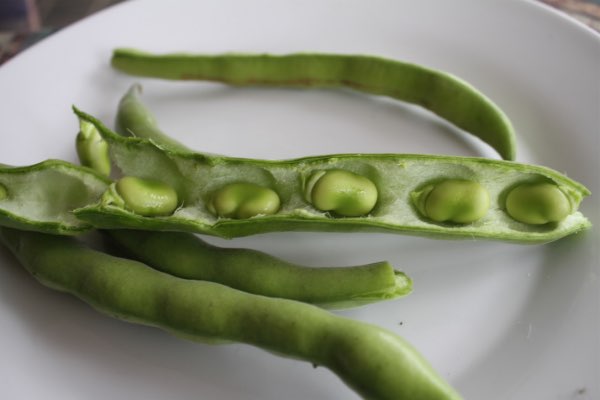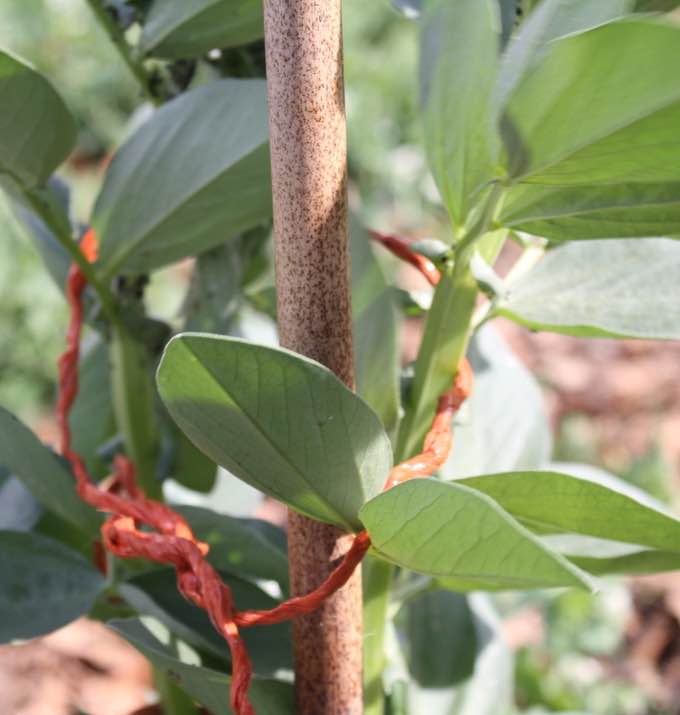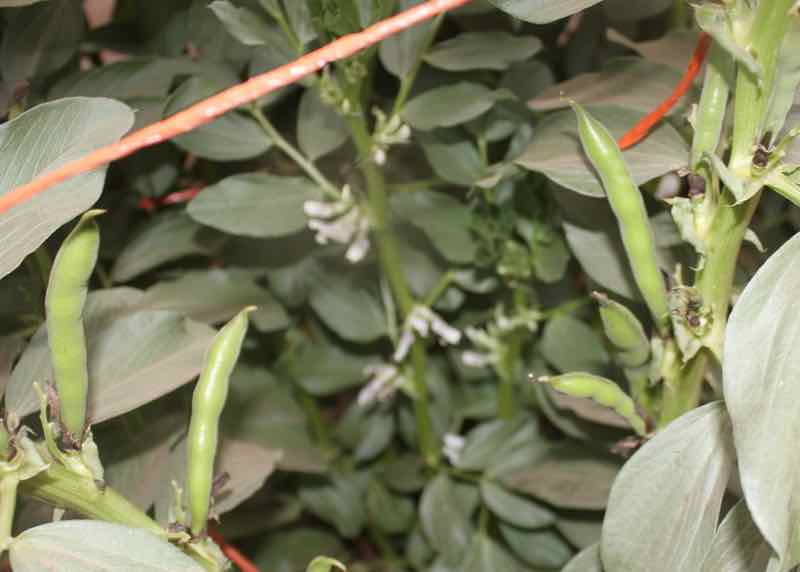- Bernard Preston homepage
- Legumes
- Minimally-processed Plant Protein
Minimally-processed plant protein
Minimally-processed plant protein is the future whether we like it or not.
These young, green fava beans are the second richest source of protein from a non-meat food. Freshly harvested they are absolutely delicious; old and starchy they are perfectly horrid. They are also exceptional in that they contain all nine "essential" amino acids; those we cannot survive without.
Soybeans are at the top of vegetable protein list but they are very indigestible unless fermented as the Chinese do; it's all about so-called antinutrients.
You will almost certainly not to be able to purchase fava-beans, except perhaps in China, Ethiopia and England; Morocco and the Blue Zone countries too; therein lies the rub. So you have to grow them yourself. It is not particularly onerous.

Red meat especially when processed as in bacon, ham and sausages, along with refined-starches from say a burger bun, has been strongly associated with chronic disease and some malignant tumours[1].
This page was updated on 8th January, 2024.
Smear that roll with margarine, add a hot dog and you have just turned it into the perfect recipe for cardiovascular disease, obesity and the attendant type-2 diabetes.
Low grade inflammation in the body is associate with a ten times poorer outlook should you have a stroke[7]. Fully one quarter of adults will one day have a cerebrovascular accident.
Not only is that excessive red meat proving deadly for us but it is also rapidly destroying the planet; both through greenhouse gases and pollution of our water-sources.
Climate-change is upon us with all its ferocity despite those in denial.
The new concept of the flexitarian diet is a huge step in the right direction. It is for those who are determined to eat less red meat but are unwilling to become vegans. In short enjoying fewer portions of beef in particular and filling the protein-gap with more peas, beans and nuts; seeds too.
It is about being flexible, not going the whole hog and becoming vegetarians; red meat might be enjoyed once or twice a week. For the rest the adherents get their amino acids from minimally-processed plant protein.
Those switching to the flexitarian way have realised that the loss of well-being of both themselves and the planet is reversible; and are determined to be part of the process. They have no desire to succumb to the pain, disease and disability they see all around them; and are willing to ring in the changes.
Minimally-processed plant protein
Minimally-processed plant protein sources are not only good for the planet, but also for us; they are one way to sustain the unprecedented population growth of Mother Earth. We call it Cyan Zone science; blue and green issues.
Blue Zone longevity and and green environmental concerns is what it's all about.
Food industry
The food industry of course has noted this change of attitude and, looking to make money whilst providing solutions has come up with what are known as plant-based meat alternatives.
They have their merits but also some inherent dangers.
They are providing alternatives from plants but they are certainly a highly-processed food.
These plant-based meat alternatives (PBMAs) use far less water to grow and generate smaller amounts of greenhouse gases, it is claimed, as compared to raising beef.
What is certain is that these PBMAs use highly-processed plant proteins that have been extracted from legumes; they cannot be considered whole foods.
The effect of these processed and refined plant proteins on human well-being has yet to be thoroughly tested. Whilst they are lower in cholesterol than meat obviously, they in fact are higher in saturated fat than whole foods like lentils, peas and fava beans; they also have far more added salt.
Served with a plateful of chips on a refined white bun they can hardly be described as wholesome, yet the concept is not without merit; it just needs further investigation. Do they contribute to lower cardiovascular disease and obesity? And do folk who buy them actually eat less red-meat?
Heme
Heme from a soy-based chemical that is high in iron is being added to some of these PBMAs to increase their meaty flavour.
Researchers reporting in the journal BMC Medicine found after doing a large meta-analysis that a daily increase of just 1 mg of heme iron is significantly associated with T2DM.[2]
They conclude that whilst iron is an essential nutrient, in excessive amounts it produces reactive oxygen species to which the beta-cells in the pancreas are particularly susceptible, raising the spectre of diabetes. Even moderate increases in heme were strongly associated with raised blood glucose and insulin levels.
Non-heme iron from plant sources does not appear to have this risk.
Plant protein and all-cause mortality
Researchers following 70 thousand Japanese adults for 18 years found that substituting plant for animal protein, mainly from red and processed meat, was strongly correlated with a lower all-cause of death from tumours and cardiovascular disease[4].
"Plant-protein intake was significantly inversely associated with the risk of overall mortality."
Take home
The "take home" from this is that both minimally-processed vegetable protein, and meat alternatives from plants may be beneficial for Mother Earth; but the same cannot be said with certainty for our own wellness. There are numerous questions that need to be answered first before PBMAs can be recommended.
Guidelines continue to recommend eating less red-meat in favour of peas and beans such as favas, limas and lentils; legumes in general.
Nitrogen-fixation bacteria
Legumes also contribute to the fertility of the soil from nitrogen-fixation bacteria that attach to their roots.
Plant your own fava beans

Favas are not difficult to grow[3]. Also known as broad beans, they need a strong central stake and have to be supported with twine. They are the very best zero-processed plant protein.
Fava bean plants do need plenty of water. That may mean that you have to consider harvesting and storing the rain.
Enjoyed from breakfast oddly in Eggs Hilton they are our perfect solution to the 11 o'clock blues; hunger-pangs that have us reaching for a cola or candy bar. In nutritional terms they give people satiety.
Blue Zone longevity
It is interesting that in all five of the blue zones of the world where ten-times as many people reach zestful old age they grow and enjoy young, green broad beans.
Blue Zone longevity has received much attention; consumption of these legumes appears to be one big reason why their elderly are so strong and vital. It's not really minimally-processed plant protein since they are enjoyed straight from the garden; and they are not generally vegetarians.

Vegan protein
Folk often find it mysterious how vegans can get enough protein without eating meat, chicken and fish; dairy-products and eggs too. They do have to work quite hard to get all the essential amino acids but it is eminently possible. Vitamin B12 remains their nemesis.
Flexitarians who are trying to eat less meat can benefit from the wisdom of the vegans. Beans, peas and nuts are great sources of protein; seeds too[5]. Tempeh in particular looks interesting to me; it ticks all the right boxes[6].
Usefulness
We hope you found this page useful. We are not advocating becoming vegetarians, though that is an option, but simply eating rather less red meat and more unprocessed vegetable protein. That would be good for both us and the planet.
The nutritional profile of broad beans is worth studying if you are interested in minimally-processed plant protein.
References
- Can Plant-Based Meat Alternatives Be Part of a nutritious and Sustainable Diet?
- A systematic review and analysis of dietary-iron intake and the risk of type 2 diabetes.
- How to plant broad-beans
- Association of Animal and Plant Protein Intake With All-Cause Mortality
- Sources of vegan protein
- How to make tempeh
- Low-grade inflammation affects stroke severity. Web: https://tinyurl.com/ye66vkh7
When browsing use right click and Open Link in New Tab, or you may get a bad gateway signal.
Newsletter
Our newsletter is entitled "create a cyan zone" at your home, preserving both yourself and Mother Earth for future generations; and the family too, of course. We promise not to spam you with daily emails promoting various products. You may get an occasional nudge to buy one of my books.
Here are the back issues.
- Lifestyle and ideal body weight
- What are ultra-processed foods?
- Investing in long-term health
- Diseases from plastic exposure
- Intensive lifestyle management for obesity has limited value
- A world largely devoid of Parkinson's Disease
- The impact of friendly bacteria in the tum on the prevention of cancer
- There's a hole in the bucket
- Everyone is talking about weight loss drugs
- Pull the sweet tooth
- If you suffer from heartburn plant a susu
- Refined maize meal and stunting
- Should agriculture and industry get priority for water and electricity?
- Nature is calling
- Mill your own flour
- Bake your own sourdough bread
- Microplastics from our water
- Alternative types of water storage
- Wear your clothes out
- Comfort foods
- Create a bee-friendly environment
- Go to bed slightly hungry
- Keep bees
- Blue zone folk are religious
- Reduce plastic waste
- Family is important
- What can go in compost?
- Grow broad beans for longevity
- Harvest and store sunshine
- Blue zone exercise
- Harvest and store your rainwater
- Create a cyan zone at your home
Did you find this page interesting? How about forwarding it to a friendly book or food junkie? Better still, a social media tick would help.
- Bernard Preston homepage
- Legumes
- Minimally-processed Plant Protein
Address:
56 Groenekloof Rd,
Hilton, KZN
South Africa
Website:
https://www.bernard-preston.com